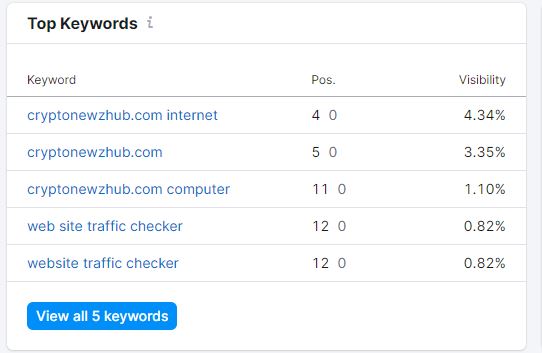
Guest Posting meaning in 2024
A Guest Post is an article written by us for a blog platform or website of a third party person or company.
Benefits of Guest Posting
1. Increase SEO and website authority
Guest posts sometimes contain backlinks or mentions to your website. These backlinks can indicate to search engines that the content offered on another platform's blog is valuable, and your website has something positive to offer.
The more reputation the host blog has that allows you to write an article, the more positive it will be for your website. We can use the “Ranking Analysis Tool” to look at the reputation of a website.
2. Increase visits to your website
Guest blogs report new visits from different readers to your website. From the host blog, its regular users can discover your content and become loyal followers. That's why it's so important that the content on your website is similar to that of the host website.
3. Expand your blogging network
Collaborating with other bloggers creates new relationships and opportunities, like joint ventures, lasting friendships, and more powerful blogs.
4. Marketing products or services
While you can't advertise on other blogs with guest posts, you can subtly mention offers. A well-crafted post can generate interest and drive traffic to your business and the products you offer.
5. Monetize your content
Some blogs charge fees for guest posts. Monetizing a blog doesn't have to be a negative experience; in fact, most international press articles monetize a large portion of their content. Of course, the items must be of a certain quality and meet the standards of the host company. A newspaper with a certain fame and reputation, even though it may charge money for some of its articles, must follow some guidelines and offer something to its audience.
How do I write a guest post?
- Identify blogs related to your website’s topic that accept guest posts.
You can search on Google in quotes:
“Guest posting niche on your website” - Choose a topic that relates to the host blog's target audience.
- Contact the host blogger by suggesting a topic that fits their content.
- Write an engaging and informative post that matches the style and tone of the host blog.
- Create an attractive title that can generate views. Use “Keyword Research Tool" or Blog "Title Generator Tool”.
- Use relevant links to your own content that add value to the article.
- Submit the guest post to the host blogger.
How to properly optimize a Guest Post on Other Sites
- Add visual elements to your content, such as eye-catching images that relate to the written content. Use in graphics if necessary.
- Write content that can encourage commenting or sharing on social media, asking readers for their opinions, or asking for additional information to be added.
- Promote your author bio via a link or mention. There are websites dedicated exclusively to this topic that can add meaning to your work as a major author.
- Share your guest post on your social networks and relevant forums that you usually participate in.
- Track your guest post performance by first checking if it has been indexed on Google.
To do this, we write the following in the search engine search field: “site:url_of_your_article”. - Check your post's organic traffic and visits on search engines like Google after a month of publishing by entering the URL into the “Lookkle Organic Traffic Analysis Tool”.
List of some websites where you can easily publish guest posts
Here is a list of websites where you can easily guest post:
- Lookkle Guest Post. Our small place for guest articles that if they meet a certain quality and content related to our website can be published on our Blog with ease.
- Writing Breeze: Offers 4000+ free guest post publishing sites with high Domain Authority (DA). Although some sites are strict, this list will help you find suitable options.
- Medium: A popular content sharing platform. You can write and publish articles or contribute to relevant publications on your profile.
- Vocal Media: is a platform that connects digital influencers and content creators. It is based on stories published by external authors.
- Newsletteralways. Website with articles on almost any topic, with press releases and current events, which accepts guest articles.
- Maltepeeskortkiz. Website about movies and video games that offers guest articles on any topic in its current news section.
- Bmpg289. Website about analysis and opinions of electronic articles, which also has a small section where you can host articles from guests of interest.
- Dizial. Website with articles on food, nutrition and diets that has a section on general and current articles where you can find quality guest articles that meet the requirements of the website.
How to Find Bloggers to Exchange Guest Posts on Top Sites
Below, we show some personal tips:
- Search for bloggers in your niche or related fields on Google or social media.
- Follow them on social platforms, interact with their content and connect regularly.
- Send them a personalized email offer, introducing yourself and your blog and suggesting collaboration.
- Write an email highlighting and explaining the mutual benefit that can be achieved by expanding audiences, improving search engine optimization, or sharing expertise.
- Decide on topics of interest and determine how often you share guest posts (monthly, quarterly, etc.).
- Offer to write a guest post with top-notch content first.
SEO optimization to consider for your Guest Post
Search engine optimization for blog articles is about writing and optimizing content through specific analysis in order to position it in search engines such as Google.
The most important tasks to keep in mind for your guest blog post are:
- Keyword Research: Find keywords relevant to your niche with tools like “Keywords Research by Lookkle”. These keywords should be terms that people search for regularly. To do this, you can use Google's search engine suggestions by entering the keyword in the search box and viewing the suggestions that appear.
- Choose an appropriate keyword: From the list of possible keywords or search terms, select a keyword that has low competition and a high number of searches. You can confirm this in the “Keyword Research Tool” by looking at the search number and percentage of competition shown.
- Check search intent: Make sure your content matches users' queries on a search engine. You can check this on Google by searching for your keyword and looking at the headlines of each result. If you notice that most of the results have little to do with what you're looking for, that's an indication that you're looking for a low-competition keyword.
- Long-tail keywords: Use 1-2 specific keywords in each article. Use long enough keywords or search phrases that may have good traffic and low competition.
- On-page SEO: Optimize your publications by including the selected keyword in the blog article title meta descriptions and internal links. With the “Keyword Analysis Tool” you can check the sensible use of these keywords within an article.
- Link Building: Get high-quality links to the published guest articles. You can promote them in comments on other blogs with a similar topic or in forums where the topic is discussed. Backlinks are authority signals for search engines.
Tips on SEO and Online Business
Next Articles
Previous Articles














